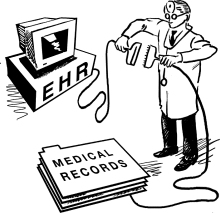Thumbs Up For These Progressive Healthcare Companies!
It’s About Time!
 Apparently it is becoming more common place for healthcare companies to deny employment to applicants who smoke, even in their off time. While many object, there are still 21 states that allow the practice, and it’s becoming more popular. Not only does it cost much more for an employer to insure a smoker, but the employee is going to miss more work due to smoking related diseases, most likely not be a good fit for a health conscious company, and, of course, last but not least, the employee’s breath and clothing will offend many. We say more power to the employers who stand up for their rights! Read more here.
Apparently it is becoming more common place for healthcare companies to deny employment to applicants who smoke, even in their off time. While many object, there are still 21 states that allow the practice, and it’s becoming more popular. Not only does it cost much more for an employer to insure a smoker, but the employee is going to miss more work due to smoking related diseases, most likely not be a good fit for a health conscious company, and, of course, last but not least, the employee’s breath and clothing will offend many. We say more power to the employers who stand up for their rights! Read more here.
Secret Kickbacks Paid To Doctors
You May End Up With a More Expensive Trip to the Pharmacy
 One of the largest drug manufacturers, Genentech, has been paying incentives to opthomologists who prescribe their very expensive drug, Lucentis, for patients with macular degeneration. Much less expensive alternatives, even by the same drug company, are available. The payments are tiered, and the doctors receive even more if they beat their last quarters’ quota. Even though these incentives may be legal, are they ethically correct??? Read this article for more information:
One of the largest drug manufacturers, Genentech, has been paying incentives to opthomologists who prescribe their very expensive drug, Lucentis, for patients with macular degeneration. Much less expensive alternatives, even by the same drug company, are available. The payments are tiered, and the doctors receive even more if they beat their last quarters’ quota. Even though these incentives may be legal, are they ethically correct??? Read this article for more information:
Friend or Foe?
Electronic Health Records — Friend or Foe?
 While some would argue that having almost instant access to your electronic health records (EHR) could potentially save your life in an emergency situation, or possibly prevent a dangerous or even fatal drug interaction, others claim that it’s all too easy for the information to be breached and fall into the wrong hands!
While some would argue that having almost instant access to your electronic health records (EHR) could potentially save your life in an emergency situation, or possibly prevent a dangerous or even fatal drug interaction, others claim that it’s all too easy for the information to be breached and fall into the wrong hands!
EHR may indeed improve the safety and delivery of quality health care, may be cost effective and may reduce patient charting errors. However, the costs involved in computerizing medical records can be formidable and present a significant burden to smaller health care practitioners. But, more concerning, is what happens when confidentiality and security regulations are not stringent enough?
Who controls that fuzzy ethical line? Who limits the number of people given access? What additional loss of control is there when the records are stored in databases overseas in countries where $300.00 is a whole month’s pay? Take the scenario of a hacker penetrating the EHR system and disseminating confidential information on the internet. Perhaps a prospective employer learns that a potential employee has a disability, may be too expensive to insure or has been treated for a life threatening illness or mental health issues. Is EHR helpful or harmful?
